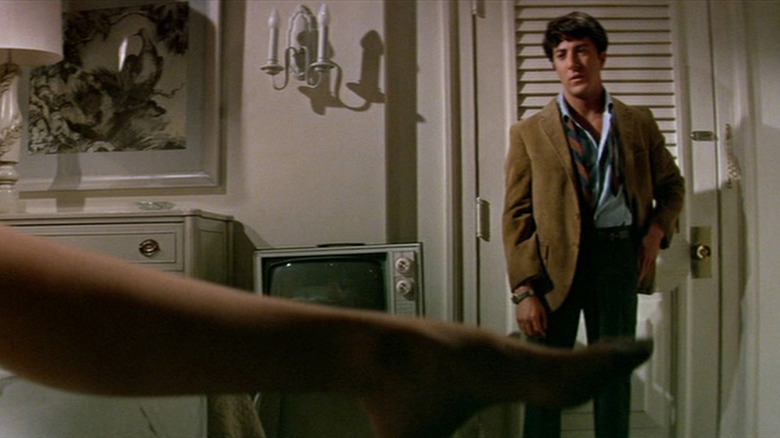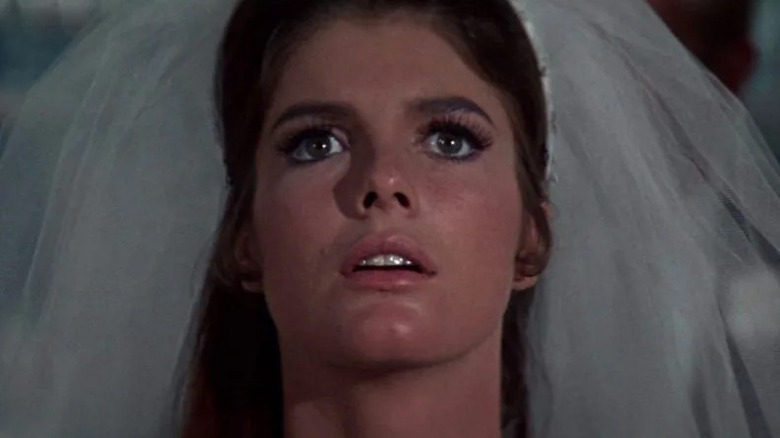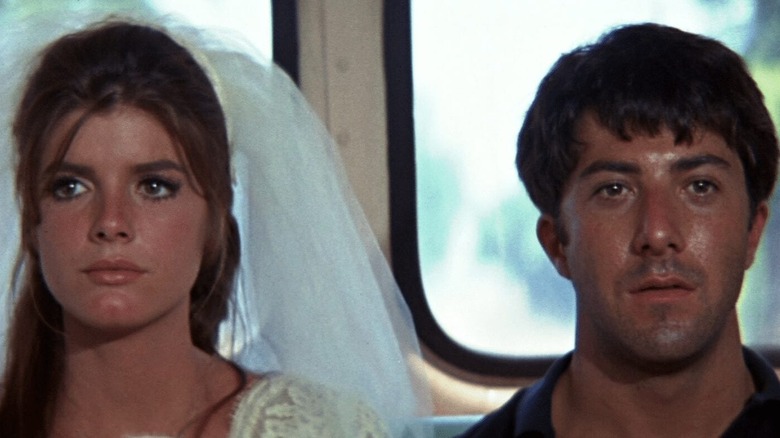The Graduate Ending Explained: What Are You Going To Do Now?
Released in 1967, Mike Nichols' coming-of-age comedy "The Graduate" follows an insecure recent college grad named Ben Braddock (Dustin Hoffman) who has an affair with his older neighbor, the seductive Mrs. Robinson (Anne Bancroft), then falls for her daughter Elaine (Katharine Ross). Despite knowing about his tryst with her mother and other uncertainties, Elaine becomes interested in Ben. However, her father (Murray Hamilton) forces her to quit college and marry her classmate Carl, whom she briefly dated. Ben travels to the Santa Barbara wedding to stop her, speeding along in his Alfa Romero until it breaks down and he's force to run to the church on foot.
Throughout the entire film, adults have been discussing and planning Ben's future without bothering to listen to his concerns or apprehensions. Standing on the second floor of the church in the film's climax, Ben is finally heard when he bangs on the glass and wails, "EEELAAAIIINEEE!" just after he sees Elaine kissing her new husband (a visual that has been parodied in countless films). Elaine takes this chance to escape, and she's whisked away by Ben, becoming a runaway bride. On the surface, this is a grand romantic gesture where Ben saves Elaine from marrying someone she does not truly love, but the final shots of their exhilaration slowly fading away suggest that the ending has a deeper meaning.
Breaking Free of Parental Authority
While Benjamin makes his impassioned plea, Nichols switches to a shot of an astounded Elaine as she steps down from the altar and moves closer. She turns to the snarling faces of her parents and new husband; in obnoxious close ups, they bark orders at her that we cannot hear. Elaine dramatically looks back towards Ben and screams his name. Nichols follows with unhinged shots of Ben trying to grab Elaine while fighting off the swarming crowd of Mr. Robinson, Carl, and frenzied wedding guests.
Mrs. Robinson tells her daughter, "It's too late," the ceremony had already ended and her arranged marriage is finalized. "Not for me," Elaine spits back at her. She will not repeat her mother's tragic past of being trapped in a loveless marriage. At the end of this frantic scene, Ben removes a cross and uses it to trap Elaine's family inside the church, and the couple runs away in elation and boards a bus.
This frantic sequence illustrates the film's anti-authoritarian themes that perfectly capture the generational shift during the late 1960s. Ben and Elaine engage in a brash act of rebellion that rejects their parents strict control. It's no surprise that this scene of the younger generation bucking tradition takes place during a wedding, an antiquated ritual that would become less of an imperative during the counterculture era.
During the 1960s, adults wanted their children to follow in their footsteps, to conform for the sake of post-war America safety and tradition. Benjamin's only option seems to be unhappily working in a sterile corporate setting until middle-age. Elaine feels pressure to stop her education, marry a perfect man, and become a housewife. "Every decision they take in life is heavily influenced, and at times taken for them, by their parents. Being in the stage of life that they are, this overbearing control can feel like an insurmountable jail," The Cinemaholic explains. In this very public and outrageous act of abandoning Elaine's wedding, Ben and Elaine declare their own free will and liberate themselves from their parents' dominance. They do not want to spend their life being dictated by their parents' archaic ideals of a proper life.
The Look of Uncertainty
Once on the bus, Nichols holds on a medium shot of the disheveled couple laughing and "tingling with the electric thrill of their subversive act," as Film School Rejects describes it. But as the shot lingers, their smiles slowly fade into uncertain frowns. This look of uncertainty is accompanied by the famous Simon and Garfunkel tune "The Sound of Silence." "Nichols' extremely steady and observant camera not only captures the characters' outer tryst with the world, but gloriously delves into the inner turmoil they go through with themselves," The Cinemaholic observes. In a matter of seconds, we watch the couple's faces internally question the impact of their rash insurrection.
Although Ben and Elaine have successfully challenged their dysfunctional families, they find themselves wondering, "What now?" They want to have different lives than their parents, but is running away together the right way to do that? How much do they really know about one another? Are they really in love? If not, they are still doomed to repeat the mistakes of their elders' past.
"The Graduate" ends as it began, bookended by the same song that voices the younger characters' uncertainty. The repetition of "The Sound of Silence" insists that Ben's questioning of what to do with his life is no different than it was at the beginning of the film. He and Elaine are just as confused and directionless as ever. However, this does not mean that the ending of "The Graduate" is completely cynical. Their defiance was successful in that the lethargic Ben, who has spent his summer lolling around the pool or indulging in carnal pleasure with Mrs. Robinson, finally found a sense of purpose that forced him to take control of his life. Elaine escaped decades of unhappiness being married to someone she does not love. However, it's up to her to avoid falling back into this fate with Ben. She needs to figure out whether or not they are truly meant to be.
In their final unsure look, Nichols leaves viewers with the sense that Ben and Elaine ending up together may not be the best form of rebellion. They need to forge their own paths in the real world, unmoored from parental authority for the very first time and genuinely seeking what they want as individuals.


